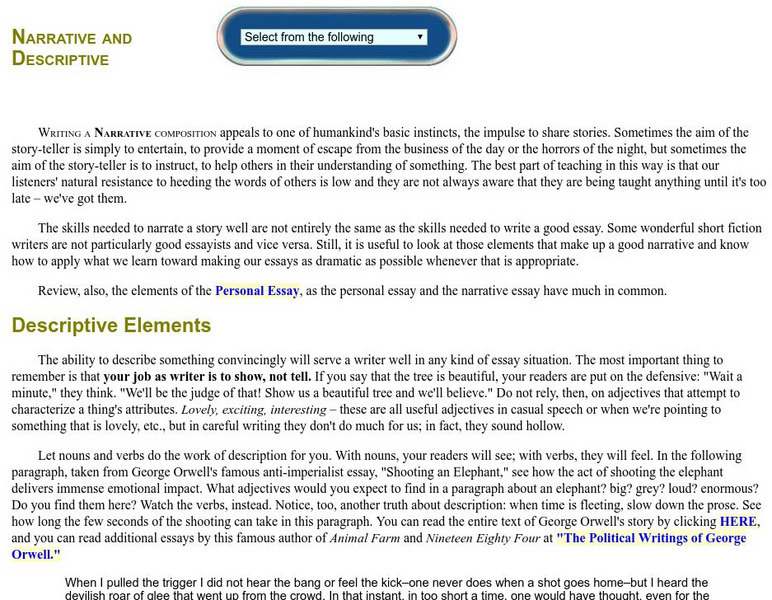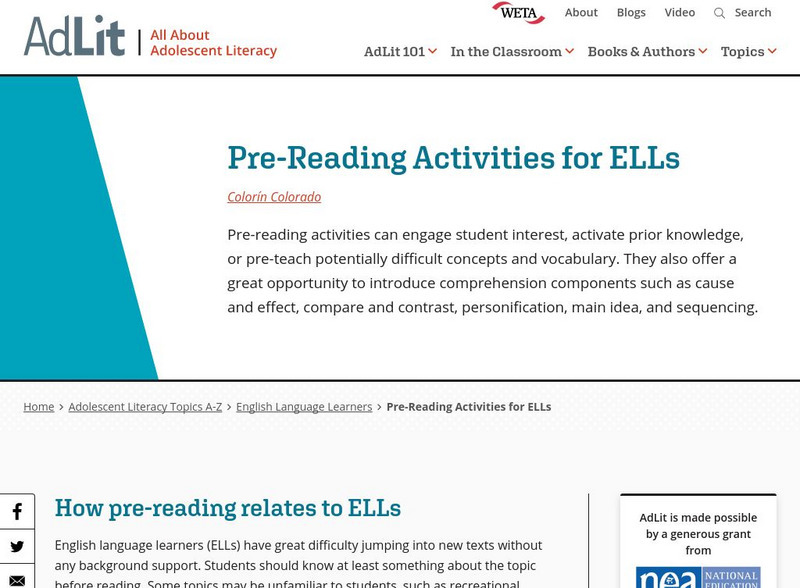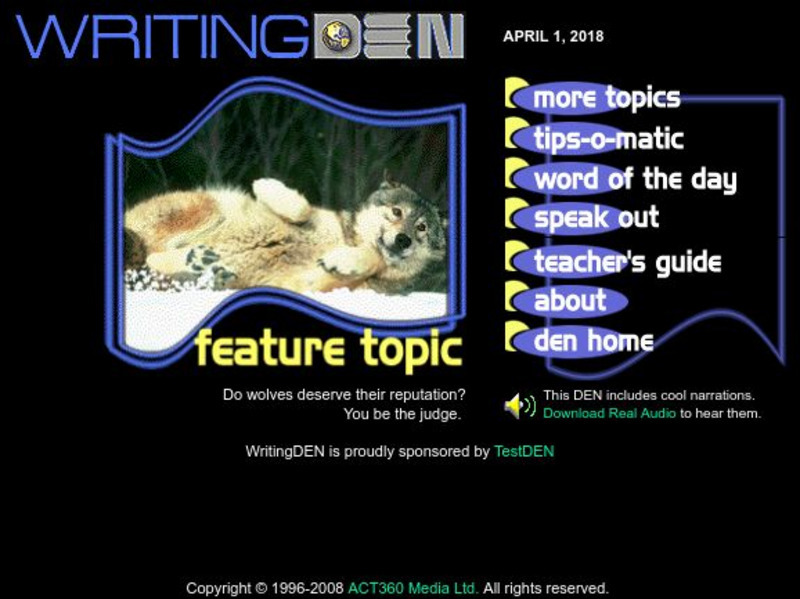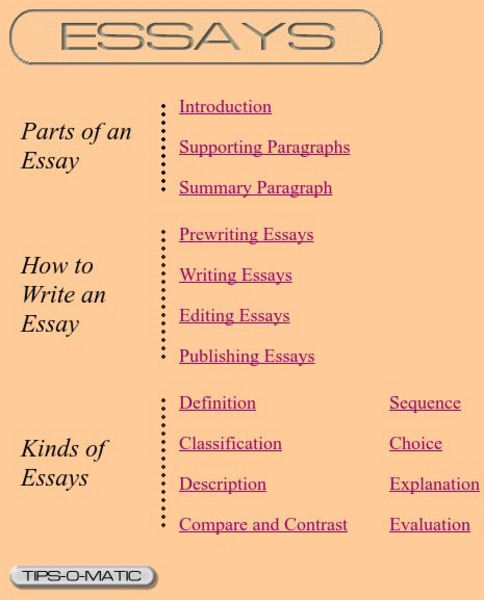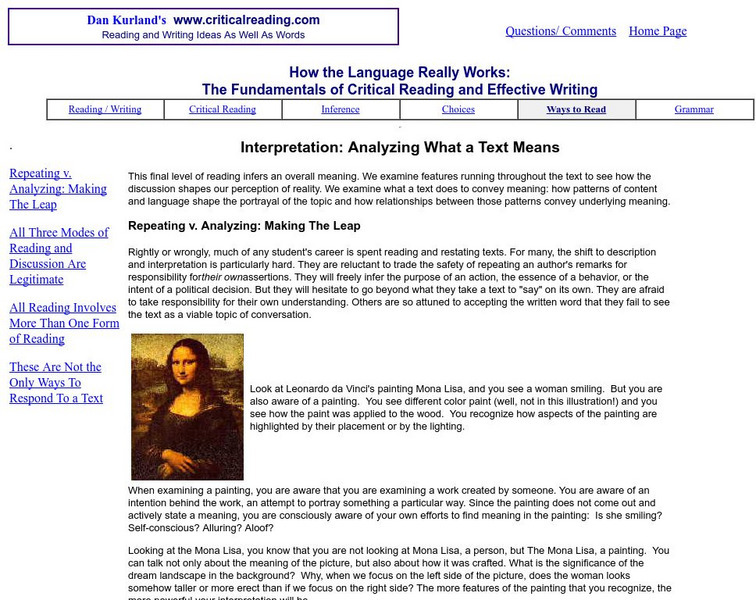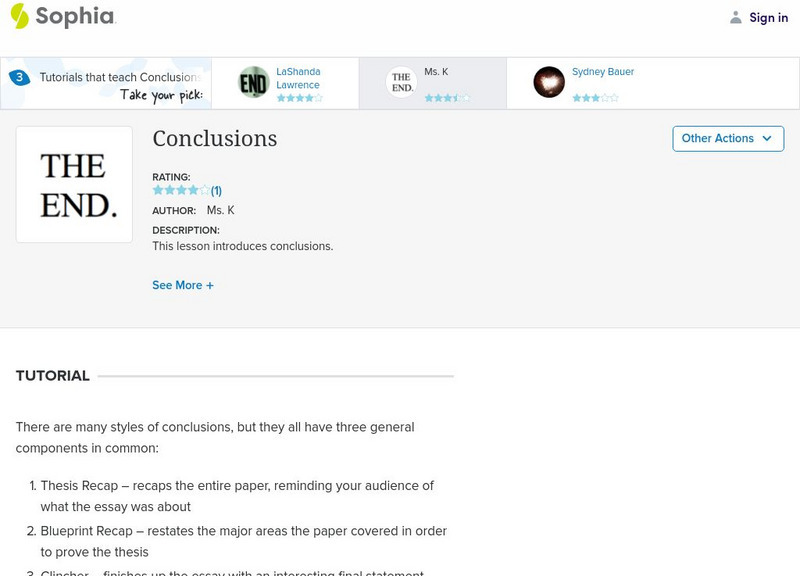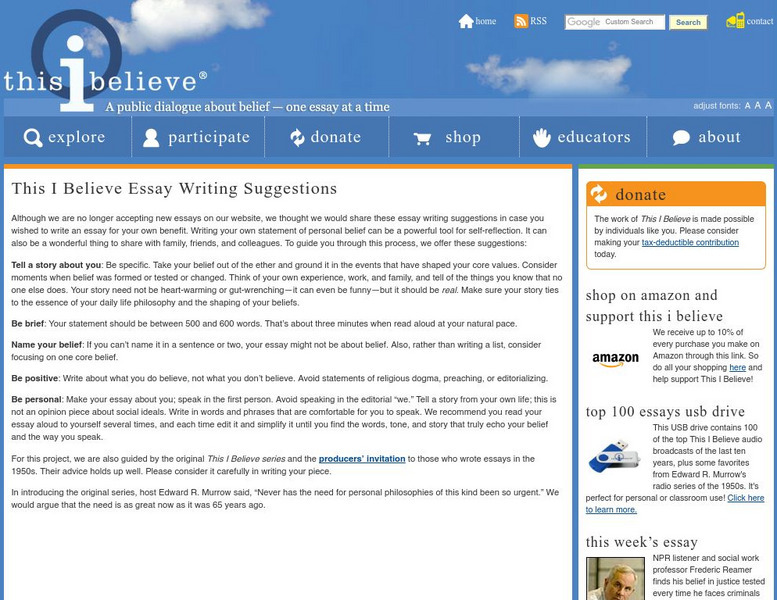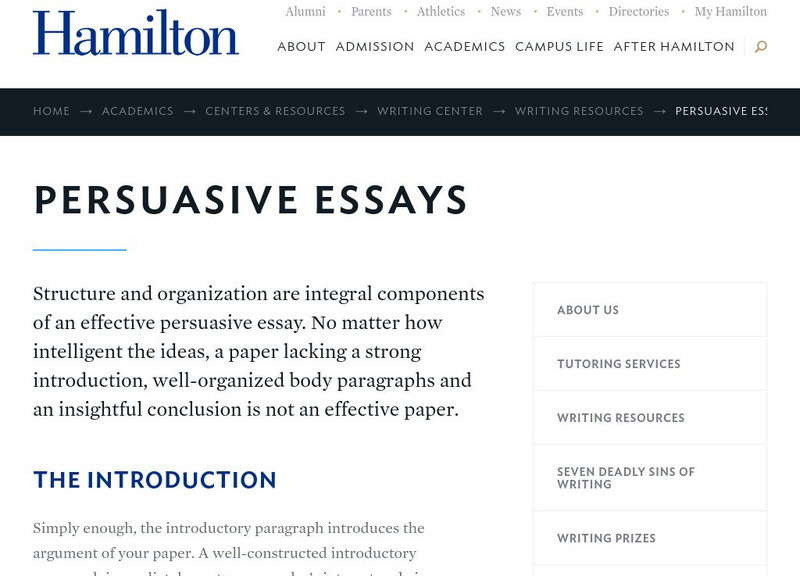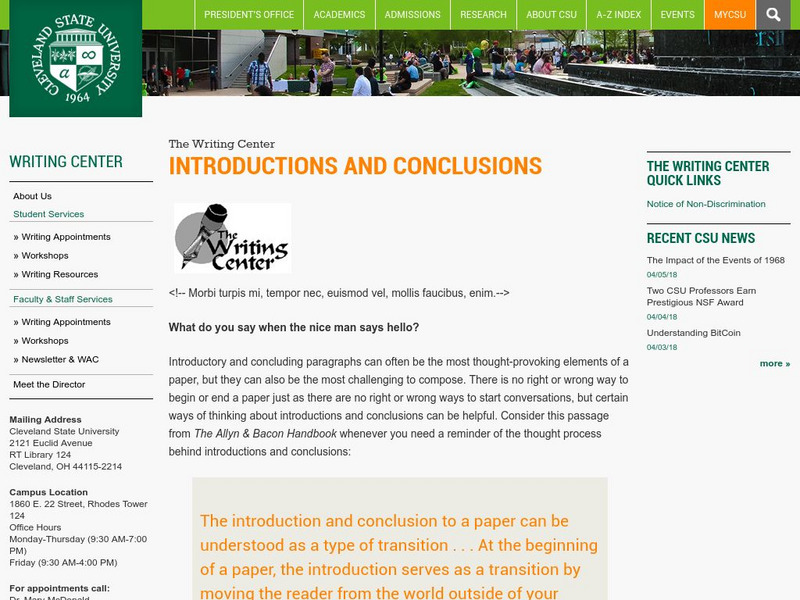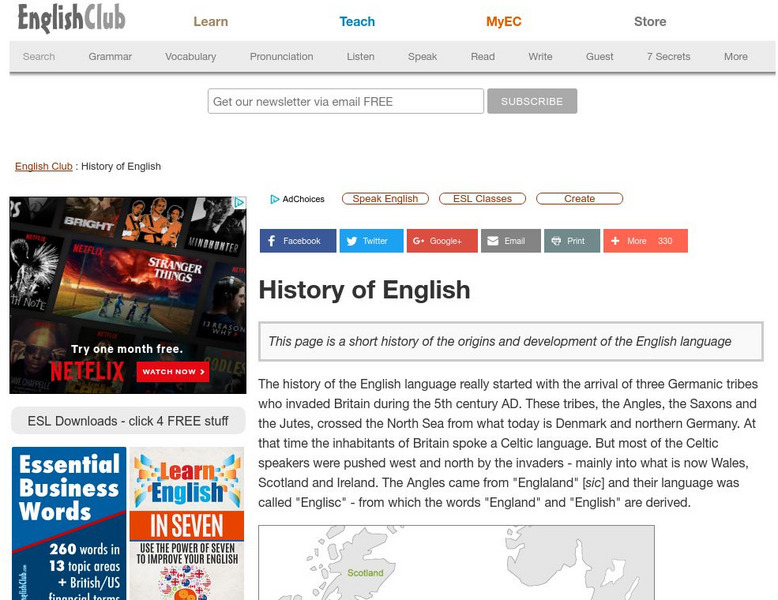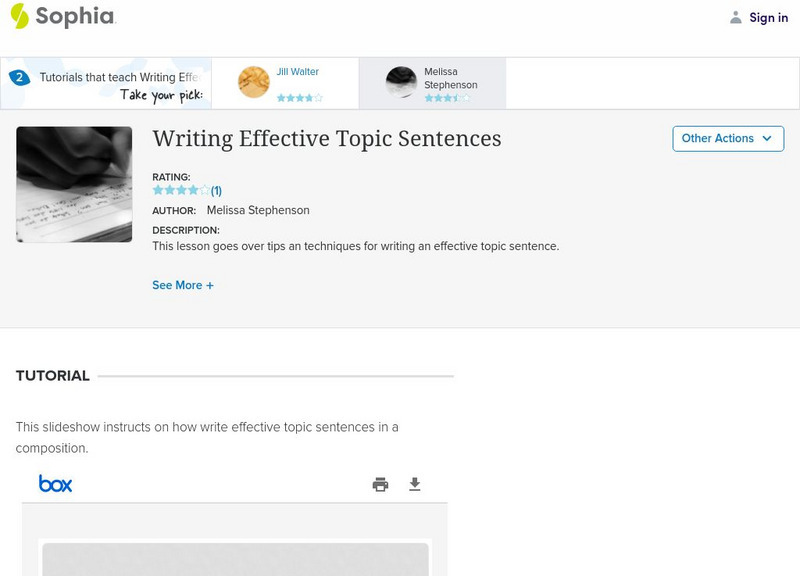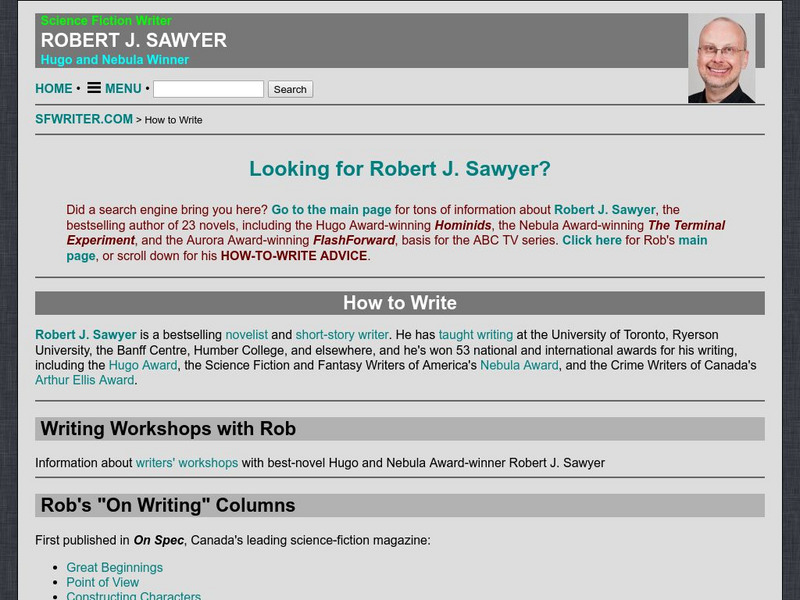Hi, what do you want to do?
Capital Community College Foundation
Guide to Grammar and Writing: The Narrative Essay
Need help picking out the elements of a narrative? Check this site out from Capital Community College, and you'll see some background information, a sample essay, and directed questions to ask yourself about a text. W.9-10.3 Narrative,...
AdLit
Ad lit.org: Pre Reading Activities for El Ls
Pre-reading activities can engage student interest, activate prior knowledge, or pre-teach potentially difficult concepts and vocabulary. They also offer a great opportunity to introduce comprehension components such as cause and effect,...
Harvey Mudd College
Claremont Colleges: Writing an Argument
Brief handout describing different forms of argument for writing.
The Write Place
Literacy Education Online: Definition Essay
This site provides guidelines for writing definition essays. It also explores various types of definition writing and provides a few short examples.
ACT360 Media
Writing Den
The WritingDEN includes feature articles with associated words, sentences, and paragraphs to aid in the writing process. Interactive features include pronunciation guides and content quizzes. The Tips-o-matic section offers grammar...
Other
Writing Den: Essay Builder
Site that gives an overview and general rules in how to write an essay. Sections include Parts of an Essay, How to Write an Essay, and Kinds of Essays.
Other
Writing Den: Essay Builder: Definition Essay
General information and guidelines about writing definition essays. Be sure to look over the entire site for lots of information about writing.
Other
Critical Reading: How the Language Really Works: Interpretation
In this brief article, the author considers the ways that readers interpret text. An interesting comparison between reading and viewing a painting is worth a look.
Grammarly
Grammarly Handbook: Conclusion or Summary
This Grammarly Handbook resource explains the purpose on writing a summary or conclusion of an essay. Brief "how to" tips are provided for writing a summary or conclusion to an essay.
University of Victoria (Canada)
The U Vic Writer's Guide: Writing Essays: Introductions
This site provides a brief overview of introductions, exploring what they are supposed to mean for an essay in writing.
University of Victoria (Canada)
The U Vic Writer's Guide: Writing Essays: Structure of an Introduction
A general overview of what goes into the introduction of an essay. CCSS.ELA-Literacy.WHST.6-8.2
Sophia Learning
Sophia: Conclusions: Lesson 3
This lesson introduces conclusions. It is 3 of 5 in the series titled "Conclusions."
Sophia Learning
Sophia: Argumentative Papers: Key Elements: Lesson 2
This lesson goes over words, phrases, and key elements that are included in argumentative papers. It is 2 of 2 in the series titled "Argumentative Papers: Key Elements."
Fun Trivia
Fun Trivia: The Four Types of Writing Trivia Quiz
A fifteen-question quiz in which the reader identifies a type of writing for each situation: argumentation, exposition, narrative, or description. Correct answers are displayed once answers are submitted.
Other
This I Believe: This I Believe Essay Writing Guidelines
Guidelines and tips on writing a good essay following the "This I believe " format.
Other
Hamilton: Essentials of Effective Persuasive Essays
This resource provides good insight on how to structure a well organized effective persuasive essay.
ClassFlow
Class Flow: Paragraph Types
[Free Registration/Login Required] This flipchart describes the four types of paragraphs, their purpose, audience, and organizing structure. Assessment questions are included.
ClassFlow
Class Flow: Paragraphs 3
[Free Registration/Login Required] This flipchart analyzes how individual paragraphs are structured in writing, examining comments sequenced to follow the shifting thoughts of a character. There are examples listed to justify a point and...
Other
Cleveland State University: Introductions & Conclusions
Briefly explains how the introduction and the conclusion work together. Then gives bulleted lists dealing with the introduction and conclusion separately. The conclusion list explains how to make a conclusion go beyond a mere summary...
English Club
English Club: What Is English?: History of the English Language
A brief history of the development of the English language including a timeline.
ClassFlow
Class Flow: Comprehension Context Clues
[Free Registration/Login Required] This flipchart discusses context clues and how students can use them to determine the meaning of unfamiliar words.
Sophia Learning
Sophia: Writing Effective Topic Sentences
This lesson goes over tips an techniques for writing an effective topic sentence. This tutorial lesson shares a short slideshow with the lesson's content.
Other
Robert J. Sawyer: Writing Workshops
This site features a list of columns written by Robert Sawyer. They include: Great Beginnings, Point of View, Constructing Characters, Show, Don't Tell, Description, Research, and more. W.9-10.3, 3a, 3b, 3c, 3e Narratives, W.11-12.3, 3a,...
Grammarly
Grammarly Handbook: Answering the Opposition in a Persuasive Essay
This page explains when and how to answer the opposing claims in a persuasive essay.





